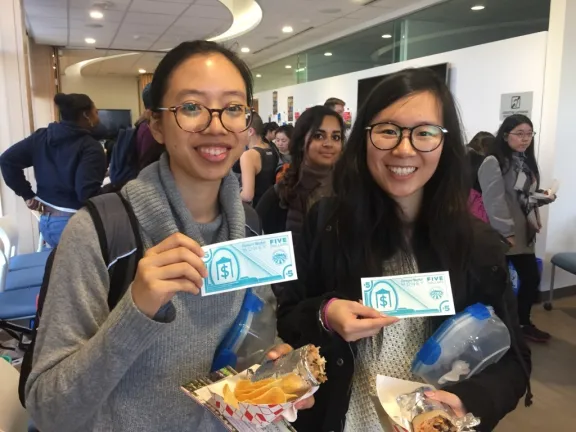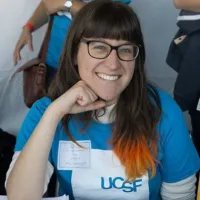
Feeding UCSF Students
Food insecurity may seem like an issue faced only by developing nations, but it is also an issue for many university students, including those at UCSF.
In 2015 the Office of Institutional Research at UCSF issued a food security survey to students in both graduate and professional schools to better understand the scope of food security issues on campus.
The top three challenges to accessing food, according to students, were lack of time to prepare and shop for food, and cost.
The Food Security for Students (FSFS) Program at UCSF has worked to develop solutions to combat food insecurity.
“You don’t think about it because, no one wants to say they are food insecure.” said Alece Alderson, Director of Student Success and First Generation Programs. “This initiative is to normalize that people need help accessing food.”
This year, thanks to a state grant aimed at combating hunger on University of California campuses, FSFS will be developing and implementing new services to address the specific needs of UCSF students.
To determine how this grant would best be spent Alderson and Barbara Smith, a financial analyst at Student Academic Affairs, decided to get input from UCSF students.
“UC [Santa Cruz] is using the money to build a community garden, but at UCSF we don’t have that space, so we thought about how we can serve our population,” Alderson said.
“[We wanted to] learn how to implement [the funds] better for our students that live in an urban space. We don’t have room for a garden, so what do our students really need?”
Last fall, students were invited to a free lunch and asked to fill out a survey about what they thought would improve food security.
This survey led to the development of several new FSFS initiatives.
“Lots of Some people at UCSF that have kids, they put their money on their tuition or family but sometimes they forget about themselves,” Alderson said.
With support from the Student Financial Aid Office, 25 students with the greatest need were identified and given monthly gift cards to purchase food at Costco, Trader Joe’s, Safeway and/or on-campus food vendors.
On Feb. 8 FSFS is launching the Student Food Market at UCSF.
FSFS is partnering with the SF-Marin Food Bank to supply students with free groceries.
To figure out how to create the most inviting and comfortable environment, Alderson did some research, visiting San Francisco State’s pop-up food market.
The market offers students cauliflower, potatoes, cabbage, onions, apples, pears, canned tuna, rice and “really awesome snacks,” said Alderson.
The Student Food Market at UCSF intends to offer the same, with 70 percent of the food being fresh produce, proteins, snacks, and food staples.
“[We’re] trying to figure out something that’s not stigmatizing,” said Alderson. “[We want to] create a warm environment so it’s not ‘here is your brown bag, get some food.’”
The market is scheduled for every Thursday until June in the Student Success Center at Parnassus. Fifty slots are available, with the possibility for expansion, and students can register by filling out a brief survey aimed at understanding student needs.
FSFS is also launching the Transportation for a Hunger Free Campus Program.
UCSF is partnering with Lyft to cover the first $10 of a trip to get either to or from a grocery store four times a month. Zip Car is also serving as a partner, offering a $28 credit per month.
This program will help increase transportation accessibility to food for up to 300 students.
Students in need based on financial aid information or school referrals will be the first eligible to sign up following which the larger UCSF student body will become eligible.
“[These programs] are there as a resource, there’s no judgement of who is in need and who is not in need,” Alderson said.
As of last week, 17 students have signed up for the Student Food Market and 125 students have signed up for the Lyft transportation service.
The grant money is only enough to support programs from January to June this year. But Alderson is already planning ahead, and said student feedback could help expand the program.
“At end of the program [we will] give a survey to get feedback in case the grant is renewed,” Alderson said. “It’s [figuring out] the needs and the wants and what’s most essential. We definitely want to get student feedback.”



